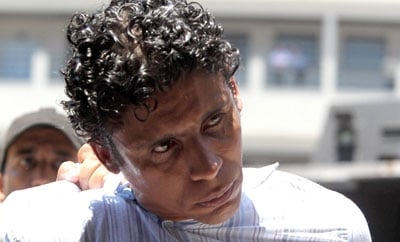A major Rio de Janeiro drug trafficker has been sentenced to 12 years in prison, as the city continues its landmark favela “pacification” program.
Antonio Francisco Bonfim Lopes, alias “Nem,” was sentenced on January 23 by a judge in Rio de Janeiro. The judge said that Nem’s Friends of Friends (Amigos dos Amigos) gang, which runs the local drug trade and extorts favela residents, was “notoriously large and dangerous” and the drug boss had caused “immense social damage,” reported news agency Estadao Conteudo.
Nem had nine arrest warrants pending when he was caught in the trunk of a car trying to flee Rio’s largest favela, Rocinha, in November 2011. His gang, one of two main rival organizations that emerged following a split in Brazil’s Red Command (Comando Vermelho) criminal group, was estimated to earn $5 million per month through control of the local drug trade, according to the New York Times.
He made his attempted escape three days before the military arrived to occupy Rocinha as part of of the government’s pacification program. Following a securing of the area by the military, the program sees a pacifying police force (UPP) installed. Rocinha received its UPP unit in September last year, the biggest such deployment since the program’s inception in 2008.
InSight Crime Analysis
Nem’s conviction will be seen as one of the biggest successes to date for the pacification program, which has seen 30 UPP units deployed in Rio’s favelas to date. The ambitious security initiative aims to take back control of the city’s favelas from drug dealers and install an effective police presence in local communities. Tackling crime in Rio has become increasingly important in the run-up to the city’s hosting of the 2016 Olympic Games and 2014 FIFA World Cup.
Rocinha’s is a strategically important location being the city’s largest favela and also being located close to the Olympics site. Despite the successful arrest and subsequent conviction of Nem, Rocinha experienced a turbulent few months following his detention. It took close to a year for the favela to be deemed secure enough for a UPP to be deployed there, as rival drug traffickers from the Red Command and Friends of Friends fought to take over control after Nem’s capture. There were also reports that the occupying military officers were taking bribes from drug traffickers.
The first major impact study of the UPPs, released last year, was positive, finding violent deaths had been significantly reduced in favelas where they had been installed. Meanwhile, crime has increased in the city of Niteroi, near Rio, and murder rates have surged in the northeast of the country, which may be in part due to some drug traffickers shifting their area of operation in response to Rio’s security crackdown.

